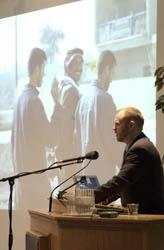Soldier/journalist speaks on news coverage in war
After a year as a military journalist in Iraq, Marshall Thompson, a USU graduate, spoke to students about how the media is being censored and manipulated in the war zone.
His lecture on Tuesday in the Eccles Conference Center exposed listeners to the military’s justifications for controlling and censoring the media, which include to protect security, ensure accuracy, avoid the complication of military policy, cover up mistakes and demoralizing stories and propriety. He also examined the ways the military can censor the media, including cover-ups, confiscating source material and controlling where journalists go, whom they speak to and to what information they have access.
Regarding security, Thompson explained the importance of restricting information that could compromise soldiers’ safety if released by the media. However, he said that “security” is often used as an excuse to censor. He related an experience when he received a call from a colonel who called him a murderer.
“He said that I had run a photo in our newspaper of an Iraqi soldier, that someone had found this photo, gone to the man’s house while he was on leave and killed him, and that I was responsible for it,” Thompson said.
They immediately stopped printing the faces of Iraqi soldiers in the paper in order to protect them.
Later Thompson discovered the man who had been murdered had never been in the newspaper at all and that the colonel who had called hated the media. Thompson said, “I can only guess at his reasons for making the assumption” that running the man’s picture in the paper had contributed to his death, “but…too often in the combat zone, security is used as an excuse to censor when it actually isn’t a security issue.”
While explaining military cover-ups, he recounted a story in which he witnessed the cover-up of a mortar training exercise accident where soldiers accidentally blew up a house in a nearby town. Thompson said that no one knows if anybody was killed because there was absolutely no investigation, and the accident was never reported until now.
“So you can imagine these kinds of incidents, just imagine what you are not being told, what will never surface, except maybe in death bed confessions,” he said.
Besides cover-ups, Thompson said the military has many ways of controlling what is and is not reported. One way is to confiscate source materials such as notes and video footage. “This is strictly against U.S. military guidelines, yet it happens all the time,” Thompson said. “If they find out there is something embarrassing… they will try to take your source material away from you.”
Also, officials may revoke a journalist’s privilege to travel and talk with troops, or they can arrange for journalists to speak only to those who truly believe in the official stance.
Thompson said, “The journalist goes into the interview, they feel like they’re getting an honest interview, and they are. But what they’re not getting is a representative picture of Iraq as a whole.”
Thompson concluded, regarding censorship, saying, “I would suggest that when it is necessary is a very, very narrow, certain set of circumstances involving security, and nothing else. It’s a hard question during wartime, but as a military journalist I would hope that in the future when we err, we err on the side of truth, because truth in the end is the only hope for countries like Iraq.”
Thompson served as a military journalist in Kosovo, Macedonia, and Korea, as well as Iraq. He recently made headlines for his walk across Utah to call for the withdrawal of U.S. forces in Iraq. He is currently an active reservist, is working on his master’s degree from Ohio University, and will be traveling soon to Jerusalem for an internship with the Associated Press.
-dpedwards@cc.usu.edu

